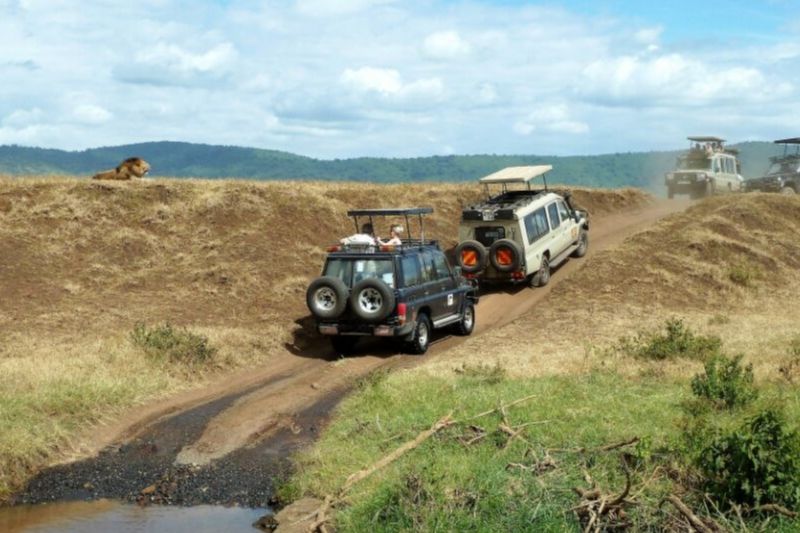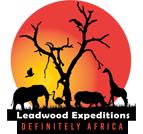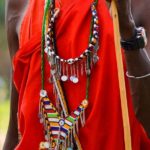The question of when to go for a safari in Tanzania often depends on what you want to experience. And while game viewing and other safari activities are possible pretty much year round, travelers have come to identify three distinct travel seasons — Peak, Low, and Shoulder. Each travel season comes with its own set of pros and cons.
If you travel during the peak season, you’re almost guaranteed spectacular wildlife sightings. But you’ll also be surrounded by larger crowds at these unique sightings, which for some can dampen the experience. If you travel during the low season, you’ll get some rains, which can hinder some safari activities, but you’ll also have lush green landscapes, perfect for wildlife photography. If you travel during the shoulder season, you might get hot and have some rain, but you’ll be rewarded with a more private safari experience with lower price rates.
By knowing what to expect with each travel season, you can make an informed decision on which option best suits your style and wallet.
Low/Off-Peak Season

The low season usually runs from November to April. Although it is the rainy season, the rains are not monsoon-like or constant, so game drives are definitely possible. Clouds build up during the day, breaking in the late afternoon for light showers. Thunderstorms with lots of lightning often occur mostly in the evenings. The weather will also be hot and humid during this period, so it’s best to consider a lodge with air conditioning and a swimming pool. The sun is usually intense, so sunscreens, sunglasses, a hat or cap are non-negotiable.
Advantages
- More exclusive experience at lower prices during the low season. Fewer visitors make for less occupancy of safari, lodges, and camps. Accommodation rates are lower, and while prices go down, services, facilities, and the experience don’t. Taking advantage of the off-peak season can afford you more luxury for less money.
- Green grasslands, lush landscapes, and dramatic skies travel during the off-peak season. Dark rain clouds are the perfect backdrop for photos, and the dry steppe turns into vibrant grasslands.
- The absolute highlight of the low season is the calving period. Foals, calves, puppies, piglets, and cubs are usually born during this season.
Disadvantages
- You may not see as many animals compared to the peak season. This is because the bush springs back to life and the vegetation and thick greenery give them ample places to hide and shade from the sun.
- Animals roam much further due to the surge in the amount of water readily available.
- The low seasons are usually hotter, muddier, wetter, and more humid than the peak season.
- There are more bugs and mosquitoes during this season.
Peak Season

The high or peak season usually runs from around June to October. The major highlight of traveling during the peak season is that game is much easier to find. Due to the lack of rain, the vegetation thins out radically. During this period, animals do not move far away from what is left of the water sources so they’re easier to spot. Nocturnal animals, like the bat-eared fox, become diurnal, radically increasing your chances of spotting them.
Advantages
- During the peak season, the days are cooler. There is usually less humidity and no rain so you may not need a lodge or camp with air conditioning or swimming pool. This can be a big saving at peak season, as rates are usually higher.
- Multi-day walking safaris are best during this period as the weather is cooler and walking will be less exhausting with much lesser mud around.
- If you choose to, you could also combine your safari with climbing Mt Kilimanjaro because the shale that makes up the summit is far more stable and easier to climb in cooler weather.
Disadvantages
- High seasons equals higher rates because peak season coincides with the North American and European summers. The demand for accommodation is much higher, so you’ll want to make your booking further in advance to ensure your first choice of lodge or camp.
- The annual Great Migration occurs during the peak season which is a top wildlife event. Therefore, you can expect to stay at lodges and camps running at full capacity with game drive vehicles filled with the maximum number of guests.
Shoulder Season

Shoulder season is an industry term used to refer to the transitional months between the peak season and the low season. If you find no joy whatsoever in throngs of people all attempting to do the same thing at the exact same time, you may want to consider booking your next safari vacation during the shoulder season.
Advantages
- Asides the possibility of off-peak airline upgrades, accommodation fees are cheaper during the shoulder season. A good number of hotels, camps, and lodges offer much lower rates in the quieter months. In addition to lower rates, with fewer visitors during the shoulder season, the staff at lodges, camps, guesthouses, and hotels are generally under less pressure and far more relaxed. This advantageous guest-to-staff ratio allows staff to pay more attention to visitors and offer better quality service.
- For visitors on safari, less crowd ensures space and superior vantage points on game vehicles. Game rangers are able to offer a more personable interaction on game drives, resulting in a far more intimate game experience.
Disadvantages
- The weather is usually hot and animals are harder to spot during the shoulder season.
Tanzania enjoys a favorable temperate climate, making it a great all year round destination. Hopefully, this guide has provided some insight into helping make the best choice. If Tanzania is on your bucket list and you would like to get more information, contact us or by calling or filling out our contact form.
Check out some of our Tanzania tours below:
- 9 Days 8 Nights Tanzania Safari and Zanzibar Beach Holiday
- 8 Days Tanzania Great Migration Experience
- 7 Days 6 Nights Taste of Northern Tanzania Safari
- 6 Days 5 Nights Best of Tanzania Big Five Safari





